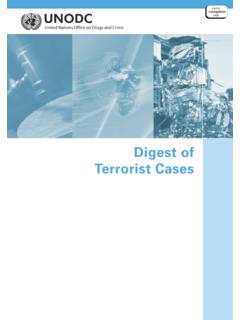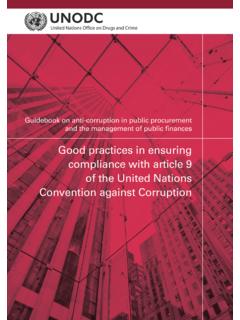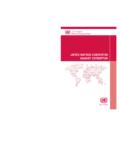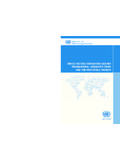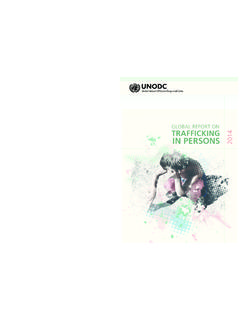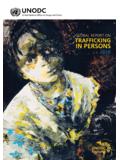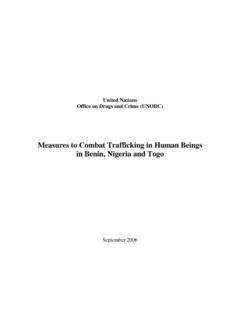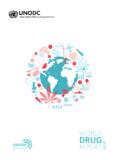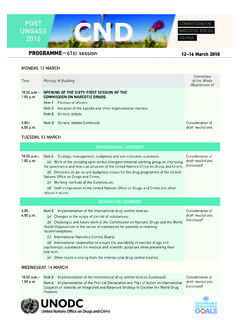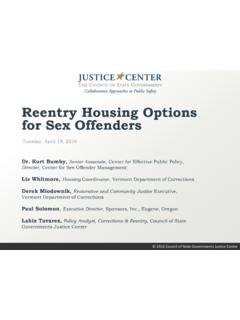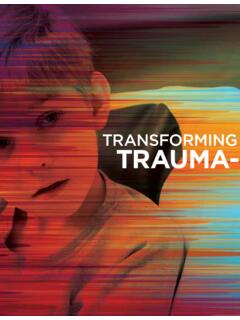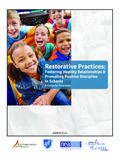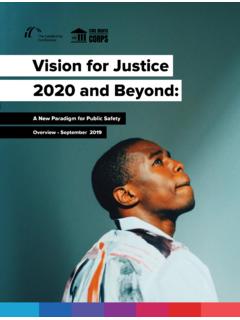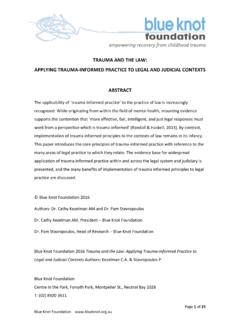Transcription of THE BANGKOK RULES - unodc.org
1 THE BANGKOK RULES United Nations RULES for the Treatment of Women Prisoners and Non-custodial Measures for Women Offenderswith their CommentaryGeneral AssemblyDistr.: General16 March 2011A/RES/65/229 United NationsSixty-fifth sessionAgenda item 105 Resolution adopted by the General Assembly on 21 December 2010[on the report of the Third Committee (A/65/457)]65/229. United Nations RULES for the Treatment of Women Prisoners and Non-custodial Measures for Women Offenders (the BANGKOK RULES )The General Assembly, Recalling the United Nations standards and norms in crime prevention and criminal justice primarily related to the treatment of prisoners, in particular the Standard Minimum RULES for the Treatment of Prisoners,1 the procedures for the effective implementation of the Standard Minimum RULES for the Treatment of Prisoners,2 the Body of Principles for the Protection of All Persons under Any Form of Detention or Imprisonment3 and the Basic Principles for the Treatment of Prisoners,4 Recalling also the United Nations standards and norms in crime prevention and criminal justice primarily related to alternatives to imprisonment, in particular the United Nations Standard Minimum RULES for Non-custodial Measures (the Tokyo RULES )
2 5 and the basic principles on the use of restorative justice programmes in criminal matters,6 Recalling further its resolution 58/183 of 22 December 2003, in which it invited Governments, relevant international and regional bodies, national human rights institutions and non-governmental organizations to devote increased attention to the issue of women in prison, including the children of women in prison, with a view to identifying the key problems and the ways in which they can be addressed, Considering the alternatives to imprisonment as provided for in the Tokyo RULES , and taking into consideration the gender specificities of, and the consequent need to give priority to applying non-custodial measures to, women who have come into contact with the criminal justice system,_____1 Human Rights: A Compilation of International Instruments, Volume I (First Part), Universal Instruments (United Nations publication, Sales No.)
3 (Vol. I, Part 1)), sect. J, No. Economic and Social Council resolution 1984/47, Resolution 43/173, Resolution 45/111, Resolution 45/110, Economic and Social Council resolution 2002/12, BANGKOK RULES Mindful of its resolution 61/143 of 19 December 2006, in which it urged States to, inter alia, take positive measures to address structural causes of violence against women and to strengthen prevention efforts that address discriminatory practices and social norms, including with regard to women who need special attention in the development of policies to address violence, such as women in institutions or in detention, Mindful also of its resolution 63/241 of 24 December 2008, in which it called upon all States to give attention to the impact of parental detention and imprisonment on children and, in particular.
4 To identify and promote good practices in relation to the needs and physical, emotional, social and psychological development of babies and children affected by parental detention and imprisonment, Taking into consideration the Vienna Declaration on Crime and Justice: Meeting the Challenges of the Twenty-first Century,7 in which Member States committed themselves, inter alia, to the development of action-oriented policy recommendations based on the special needs of women as prisoners and offenders, and the plans of action for the implementation of the Declaration,8 Calling attention to the BANGKOK Declaration on Synergies and Responses: Strategic Alliances in Crime Prevention and Criminal Justice,9 as it relates specifically to women in detention and in custodial and non-custodial settings, Recalling that, in the BANGKOK Declaration, Member States recommended to the Commission on Crime Prevention and Criminal Justice that it give consideration to reviewing the adequacy of standards and norms in relation to prison management and prisoners, Having taken note of the initiative of the United Nations High Commissioner for Human Rights to designate the week from 6 to 12 October 2008 as Dignity and Justice for Detainees Week, which placed particular emphasis on the human rights of women and girls.
5 Considering that women prisoners are one of the vulnerable groups that have specific needs and requirements, Aware of the fact that many existing prison facilities worldwide were designed primarily for male prisoners, whereas the number of female prisoners has significantly increased over the years, Recognizing that a number of female offenders do not pose a risk to society and, as with all offenders, their imprisonment may render their social reintegration more difficult,_____7 Resolution 55/59, Resolution 56/261, Resolution 60/177, BANGKOK RULES Welcoming the development by the United Nations Office on Drugs and Crime of the Handbook for Prison Managers and Policymakers on Women and Imprisonment,10 Welcoming also the invitation, contained in Human Rights Council resolution 10/2 of 25 March 2009,11 to Governments, relevant international and regional bodies, national human rights institutions and non-governmental organizations to devote greater attention to the issue of women and girls in prison, including issues relating to the children of women in prison, with a view to identifying and addressing the gender-specific aspects and challenges related to this problem, Welcoming further the collaboration between the World Health Organization Regional Office for Europe and the United Nations Office on Drugs and Crime, and taking note of the Kyiv Declaration on Women s Health in Prison,12 Taking note of the Guidelines for the Alternative Care of Children.
6 13 Recalling Commission on Crime Prevention and Criminal Justice resolution 18/1 of 24 April 2009,14 in which the Commission requested the Executive Director of the United Nations Office on Drugs and Crime to convene in 2009 an open-ended intergovernmental expert group meeting to develop, consistent with the Standard Minimum RULES for the Treatment of Prisoners and the Tokyo RULES , supplementary RULES specific to the treatment of women in detention and in custodial and non-custodial settings, welcomed the offer by the Government of Thailand to act as host to the expert group meeting, and requested the expert group meeting to submit the outcome of its work to the Twelfth United Nations Congress on Crime Prevention and Criminal Justice, subsequently held in Salvador, Brazil, from 12 to 19 April 2010, Recalling also that the four regional preparatory meetings for the Twelfth Congress welcomed the development of a set of supplementary RULES specific to the treatment of women in detention and in custodial and non-custodial settings,15 Recalling further the Salvador Declaration on Comprehensive Strategies for Global Challenges: Crime Prevention and Criminal Justice Systems and Their Development in a Changing World,16 in which Member States recommended that the Commission on Crime Prevention and Criminal Justice consider the draft United Nations RULES for the Treatment of Women Prisoners and Non-custodial Measures for Women Offenders as a matter of priority for appropriate action,1.
7 Takes note with appreciation of the work of the expert group to develop supplementary RULES specific to the treatment of women in detention and in custodial and non-custodial settings at its meeting, held in BANGKOK from 23 to 26 November 2009, and of the outcome of the meeting;172. Expresses its gratitude to the Government of Thailand for having acted as host to the meeting of the expert group and for the financial support provided for the organization of the meeting; 3. Adopts the United Nations RULES for the Treatment of Women Prisoners and Non-custodial Measures for Women Offenders, annexed to the present resolution, and approves the recommendation of the Twelfth United Nations Congress on Crime Prevention and Criminal Justice that the RULES should be known as the BANGKOK RULES ; _____10 See World Health Organization Regional Office for Europe and United Nations Office on Drugs and Crime, Women s Health in Prison: Correcting Gender Inequity in Prison Health (Copenhagen, 2009).
8 13 Resolution 64/142, See Official Records of the Economic and Social Council, 2009, Supplement No. 10 (E/2009/30), chap. I, sect. See , , and Resolution 65/230, See BANGKOK Rules4. Recognizes that, in view of the great variety of legal, social, economic and geographical conditions in the world, not all of the RULES can be applied equally in all places and at all times; and that they should, however, serve to stimulate a constant endeavour to overcome practical difficulties in their application, in the knowledge that they represent, as a whole, global aspirations amenable to the common goal of improving outcomes for women prisoners, their children and their communities; 5. Encourages Member States to adopt legislation to establish alternatives to imprisonment and to give priority to the financing of such systems, as well as to the development of the mechanisms needed for their implementation; 6.
9 Encourages Member States having developed legislation, procedures, policies or practices for women in prison or on alternatives to imprisonment for women offenders to make information available to other States and relevant international, regional and intergovernmental organizations, as well as non-governmental organizations, and to assist them in developing and implementing training or other activities in relation to such legislation, procedures, policies or practices; 7. Invites Member States to take into consideration the specific needs and realities of women as prisoners when developing relevant legislation, procedures, policies and action plans and to draw, as appropriate, on the BANGKOK RULES ; 8. Also invites Member States to collect, maintain, analyse and publish, as appropriate, specific data on women in prison and women offenders; 9.
10 Emphasizes that, when sentencing or deciding on pretrial measures for a pregnant woman or a child s sole or primary caretaker, non-custodial measures should be preferred where possible and appropriate, with custodial sentences being considered when the offence is serious or violent; 10. Requests the United Nations Office on Drugs and Crime to provide technical assistance and advisory services to Member States, upon request, in order to develop or strengthen, as appropriate, legislation, procedures, policies and practices for women in prison and on alternatives to imprisonment for women offenders; 11. Also requests the United Nations Office on Drugs and Crime to take steps, as appropriate, to ensure broad dissemination of the BANGKOK RULES , as a supplement to the Standard Minimum RULES for the Treatment of Prisoners18 and the United Nations Standard Minimum RULES for Non-custodial Measures (the Tokyo RULES ),19 and to ensure the intensification of information activities in this area; 12.
